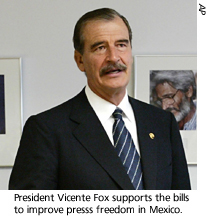New York, April 20, 2006—The Committee to Protect Journalists lauds the Mexican Chamber of Deputies’ passage on Tuesday of a bill that would eliminate criminal defamation, libel, and slander laws from federal statute books. CPJ also welcomes the chamber’s approval of a second measure that allows journalists to withhold from authorities information about sources.
Deputies, who approved the measures overwhelmingly, said they were fundamental to democracy and freedom of expression. On Wednesday, presidential spokesman Rubén Aguilar praised the votes, describing the decriminalization bill as an important measure to strengthen press freedom, the Mexico City-based daily El Universal reported.
By decriminalizing “press crimes,” defamation, libel, and slander would no longer be considered criminal offenses under federal law. Articles 350 to 363 of the federal penal code would be repealed, and journalists would no longer face prison sentences. The reform makes defamation, libel and slander civil offenses under articles 1916 and 1916bis of the civil code; such offenses would be subject to monetary damages.
The bill goes before the Senate and, if passed, to the president for his signature. President Vicente Fox, who is due to leave office in December, supports the measure.
Even if signed into law, though, the bill would not offer complete protection from criminal defamation complaints. State laws that criminalize libel would remain in effect, although Aguilar said the president is urging state legislatures to follow the lead of Congress. One state, Chiapas, is already considering such a step.
The second measure allows journalists to withhold information from authorities that could reveal the identity of a source. The bill, which offers similar protection to lawyers, physicians, and spiritual ministers, would cover tapes, telephone records, notes, archives, and documents, according to the text of the measure. The bill demands the compliance of public officials, setting prison penalties for failure to do so.
The measure, known as the “professional secrecy” bill, has cleared both chambers and awaits Fox’s signature to become a law. Fox is said to favor the bill.
“We praise the approval of these two bills, which are very important steps in advancing free expression in Mexico,” CPJ Executive Director Ann Cooper said. “We urge President Fox and Congress to make the next necessary moves to turn these vital reforms into law.”
Though imprisonment for press offenses has fallen into disuse in the Americas, prosecution on criminal defamation charges remains common. In August 2004, the Inter-American Court of Human Rights announced a ruling overturning the 1999 criminal defamation conviction of Costa Rican journalist Mauricio Herrera Ulloa, a reporter with the daily La Nación. The Costa Rica-based court ruled that the sentence violated his right to free expression and ordered Costa Rica to pay damages to him. The court’s president, Judge Sergio García Ramírez, wrote a separate, concurring opinion questioning the criminalization of defamation and suggesting that such laws be repealed.
